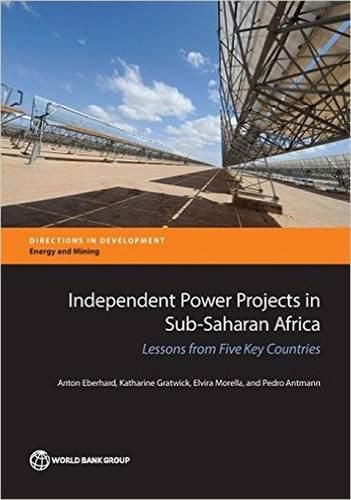Readings Newsletter
Become a Readings Member to make your shopping experience even easier.
Sign in or sign up for free!
You’re not far away from qualifying for FREE standard shipping within Australia
You’ve qualified for FREE standard shipping within Australia
The cart is loading…






Inadequate electricity services pose a major impediment to reducing extreme poverty and boosting shared prosperity in Sub-Saharan Africa. Simply put, Africa does not have enough power. Despite the abundant low-carbon and low-cost energy resources available to Sub-Saharan Africa, the region’s entire installed electricity capacity, at a little over 80 gigawatts (GW), is equivalent to that of the Republic of Korea. Looking ahead, Sub-Saharan Africa will need to ramp up its power generation capacity substantially. The investment needed to meet this goal largely exceeds African countries already stretched public finances. Increasing private investment is critical to help expand and improve electricity supply. Historically, most private sector finance has been channeled through privately financed independent power projects (IPPs), supported by nonrecourse or limited recourse loans, with long-term power purchase agreements with the state utility or another off-taker. Between 1990 and 2014, IPPs have spread across Sub-Saharan Africa and are now present in 18 countries. However, private investment could be much greater and less concentrated. The objective of Independent Power Projects in Sub-Saharan Africa: Lessons from Five Key Countries is to evaluate the experience of IPPs and identify lessons that can help African countries attract more and better private investment. The analysis is based primarily on in-depth case studies carried out in five countries Kenya, Nigeria, South Africa, Tanzania, and Uganda that have the most extensive experience with IPPs. At the core of this analysis is a reflection on whether IPPs have in fact benefited Sub-Saharan Africa, and how they might be improved.
$9.00 standard shipping within Australia
FREE standard shipping within Australia for orders over $100.00
Express & International shipping calculated at checkout
Inadequate electricity services pose a major impediment to reducing extreme poverty and boosting shared prosperity in Sub-Saharan Africa. Simply put, Africa does not have enough power. Despite the abundant low-carbon and low-cost energy resources available to Sub-Saharan Africa, the region’s entire installed electricity capacity, at a little over 80 gigawatts (GW), is equivalent to that of the Republic of Korea. Looking ahead, Sub-Saharan Africa will need to ramp up its power generation capacity substantially. The investment needed to meet this goal largely exceeds African countries already stretched public finances. Increasing private investment is critical to help expand and improve electricity supply. Historically, most private sector finance has been channeled through privately financed independent power projects (IPPs), supported by nonrecourse or limited recourse loans, with long-term power purchase agreements with the state utility or another off-taker. Between 1990 and 2014, IPPs have spread across Sub-Saharan Africa and are now present in 18 countries. However, private investment could be much greater and less concentrated. The objective of Independent Power Projects in Sub-Saharan Africa: Lessons from Five Key Countries is to evaluate the experience of IPPs and identify lessons that can help African countries attract more and better private investment. The analysis is based primarily on in-depth case studies carried out in five countries Kenya, Nigeria, South Africa, Tanzania, and Uganda that have the most extensive experience with IPPs. At the core of this analysis is a reflection on whether IPPs have in fact benefited Sub-Saharan Africa, and how they might be improved.